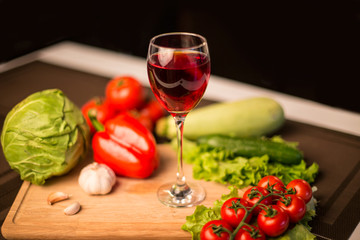A vegan label?
Today, professionals return to old techniques, they respect their environment while they are moving towards more sustainable solutions. They also try to use several techniques regarding the wine production (a biodynamic cultivation of grapes while strictly adhering to a catalogue full of specifications for a “vegan” certificate).
Since 2016, the French organisation, Expertise Végane Europe, has allowed traders and wine makers from different countries to obtain a European, vegan certificate of conformity under the label “EVE VEGAN”. The organisation reacts to the growing demand of discerning consumers practicing rigorous diets. Vegan wines are far away from being a harmless consumer trend; they are more of an answer to a concern shared by many consumers who are against any kind of animal cruelty, especially after the recent media scandals. Those wines are also an opportunity for differentiation on the market of biological wines. Both, the vegetarian and the vegan diet, are more and more common and practiced in America and Northern Europe.
What are the differences between the production of a biological, vegan or natural wine?
Most often, the wine gets “glued, filtered and stabilized” after its passage in the tank; it gets freed from all impurities to reduce the formation of tannin deposits. Furthermore, the wine gets cleared and stabilized for transportation. The traditional way of “protein binding” includes the usage of animal products, like albumin or fish glue.
However, there are numerous methods to prevent that animal substances are used to stabilise the wine’s microbial milieu, like the filtering with the aid of “diatomaceous earth”, a powder out of unicellular algae, completely natural.
Bentonite is one of the most commonly used solutions for white and kosher wines for example, as it is a mineral adhesive.
These ancient methods of wine production are still causing discussion and many associations and organisations are committed to making the mention of these methods on labels mandatory.
But what is actually a vegan wine?
In order to obtain the label “vegan”, wine makers have to adhere to following conditions:
- The usage of any animal substances is prohibited during the whole production process.
- It is prohibited to use any substances or products that were tried on animals before.
- The materials and products that are used for packaging (ink, adhesives, …) are not allowed to contain any animal substances.
The Wine Cooperative of Buzet (Coopérative des vins de Buzet) in Lot-et-Garonne has moved towards vegan wines already several years ago, after it had changed its production to biological wines before and had forgone additional sulphates. The Cooperative has developed a flour based on peas, which replaces the previous methods but without changing the look or the taste. An avant-garde and great success, as well as a brilliant marketing strategy for the Cooperative that exports about 18 % of the 12 million bottles produced in Europe and Northern America each year.
A vegan wine: a natural wine?
Attention! One has to distinguish clearly between a “natural” and a “vegan” wine.
A natural wine is made out of grapes that were grown biologically, the harvests are made by hand and there are no additives used (no yeast, no sugar, no acidity regulators, …). Normally, these wines are neither glued nor filtered and they have to contain as few sulphites as possible (Red wines less than 30mg/l and white wines less than 40 mg/l). Their conception includes only a few steps of the wine production. Thanks to their production method, some natural wines are also perfectly suitable for vegetarian or vegan consumers.
Is the organic label necessary for obtaining the vegan one?
No! A vegan wine is not necessarily organic. In order to achieve the organic label, you are only allowed to use grapes that were grown without using any toxic products and pesticides. Furthermore, certain amounts of sulphites per bottle have to be considered.
Regulations that are, according to some associations, which have nothing to do with the production of these wines, too permissive and under which a certain number of chemical products are allowed. While biodynamic wines belong to the family of organic wines, the production, however, takes place completely naturally and the ecosystem of the vines is respected. Those wines that were produced biodynamically have no recognition or legal certification.
All of this is mentioned on the bottle’s label?
Since 2013 (from vintage 2012 on), professionals have been obliged to mention all allergens or “traces of …”. However, unfortunately, it happens more and more frequently that there is no information provided on the label.
So far, there are no regulations regarding the obligation to mention any traces of animal products (different kinds of gelatine from beef or pork, fish glue …).
So, do not think that only because a wine is vegan, it is automatically organic… Or only because it is vegan, it is automatically natural… So, pay attention!





